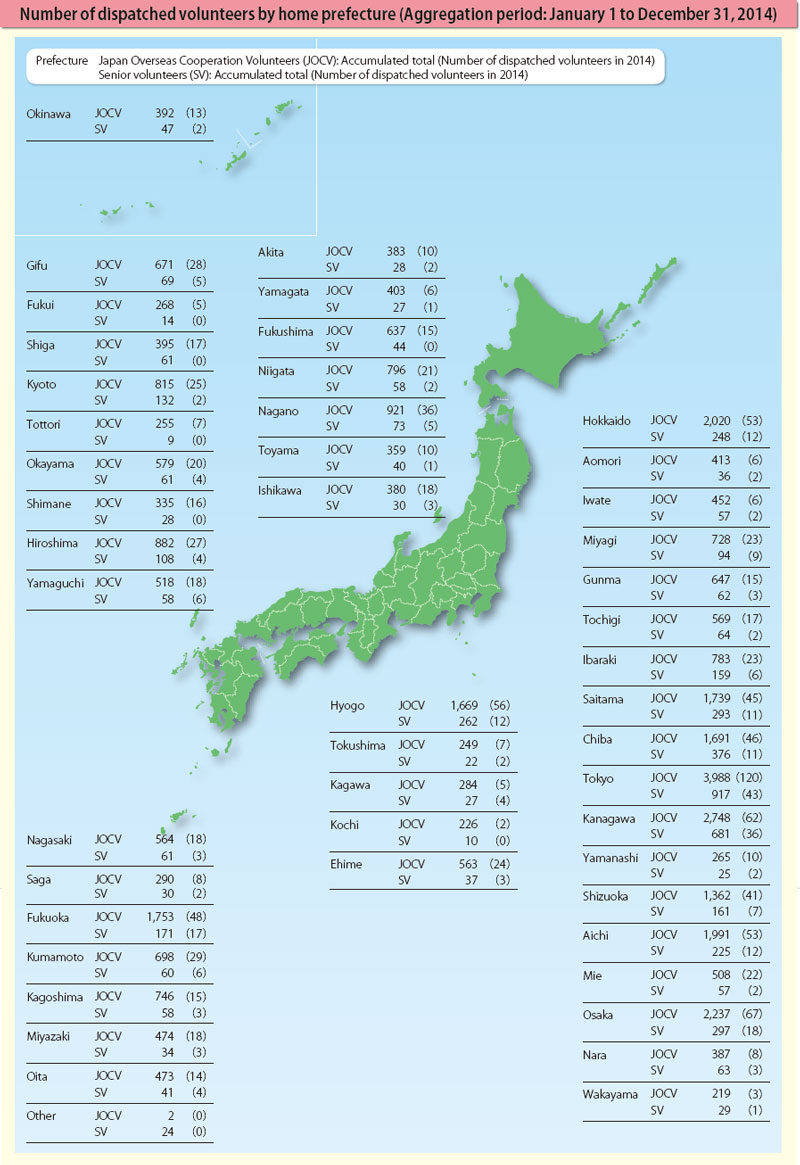Diplomatic Bluebook 2015
Chapter 4
Japan’s Diplomacy Open to the Public
2.Japanese Taking Active Roles in the International Community
(1) Japanese Taking Active Roles in the International Organizations
International organizations are found to serve the interests of the entire international community and draw on skills and traits from diverse nationalities in creating an environment where people of the world can enjoy peace, safety and prosperity. International organizations specialize in specific areas to solve global scale issues; for instance, poverty reduction, climate change, human rights, food, energy, refugee/IDPs protection, conflict prevention/peace building, plague prevention measures, education, employment and empowerment of women.
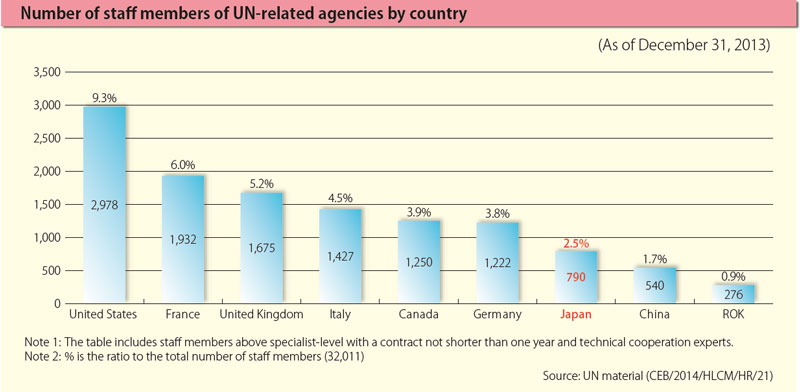
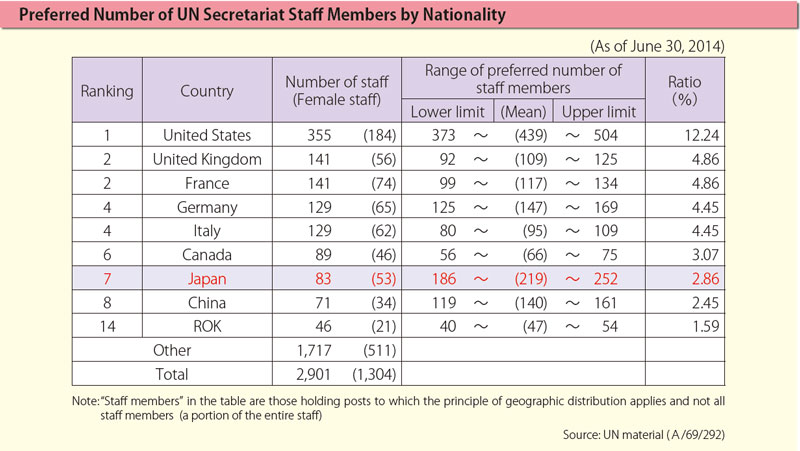
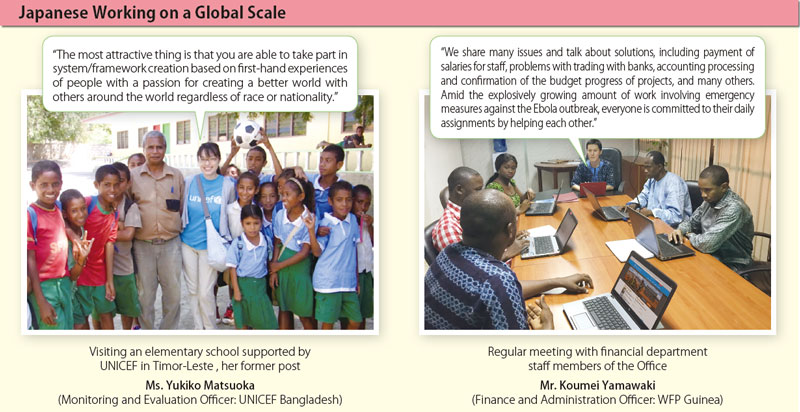
Competent individuals with specialized knowledge, passion and capabilities to contribute to the world beyond the framework of nation states are needed so that international organizations can perform their duties smoothly and fulfill their roles expected of them. In addition to financial and intellectual contributions for international organizations to deal with their tasks, Japan also makes contributions in terms of human resources to international organizations. However, unfortunately, the number of Japanese staff working in international organizations is still low compared to other major countries.
Taking the United Nations Secretariat as an example, the number of Japanese employees remains at around one-third of the “desirable number of employees” set by the UN according to each country’s population and share of the body’s budget.
More Japanese people taking active roles in international organizations translate to Japan having an enhanced presence in the international community. It will also show the world that Japan is truly committed to the promotion of peace and prosperity of the world and supports this principle. When the number of Japanese people with various international experiences increases, it will also in turn lead to enrichment of human resources in Japan.
Standing on this principle, MOFA has established a section (Recruitment Center for International Organizations, Foreign Policy Bureau) responsible for finding and training of support and information provision to human resources who work in and contribute to the international arena, with an aim to increase the number of Japanese nationals working in international organizations. In 2014, it organized 65 guidance sessions to provide information on the process of the recruitment of international organizations. It also hosted the Outreach Mission by HR staff of international organizations at five universities in the Chubu/Keihanshin area, with a total of about 920 participants.
Furthermore, it also supports the young people dispatched to international organizations under the Junior Professional Officer Program (a system of sending young Japanese nationals who aspire to work in international organizations as full-time employees for a fixed period of time to give them opportunities to gain necessary knowledge and experience in international organizations). It is also committed to designing and implementation of human resources training programs aimed at working for international organizations, coordination with HR sections of major international organizations, information collection, provision of vacancy information, and support for application procedures, etc.
Employees of international organizations are expected to play the role of a “bridge” between the international organization and their home country. For example, Japan co-hosts the Tokyo International Conference on African Development (TICAD) along with the United Nations and the United Nations Development Program (UNDP). At such International Conferences, Japanese UN staff members, who are able to understand the work process of both Japan and partner organizations and differences in the way of thinking between them, prove quite essential in moving forward with the projects and policy issues in a smooth, prompt and efficient manner and they are appreciated highly by the international organizations. The presence of Japanese staff in international organizations has vital significance also from the perspective of promotion of Japan’s diplomatic priorities.
The year 2015 marks the 70th anniversary of the UN’s founding and the year 2016 is the 60th anniversary of Japan becoming a member state. Throughout these years, Japan has consistently followed a path of a peace-loving nation and contributed to the international community in terms of finance, policy initiatives and human resources. MOFA, with its knowledge and experience, will continue to work actively so that excellent Japanese nationals with high aspiration and passion who are capable of solving issues and understand the roles and responsibility of international organizations can take part in the international organizations.
The first Memorial service for the Great East Japan Earthquake was held on 11th March 2012 at the Place du Trocadéro (Paris, France), then at Lyon City Hall for its second year anniversary, and in the town of Coria del Rio (Spain) in 2014. “Why was it held at a small Spanish town?” The answer to this question lay in the exchanges Japan had developing with Spain and other European countries as far back as 400 years ago.
After the 1611 Sanriku Earthquake, Hasekura Tsunenaga was ordered by Date Masamune, who was seeking ways to rebuild the Tohoku region, to lead a delegation to Europe. After crossing the Pacific and Atlantic oceans, Hasekura arrived at Coria del Rio in Spain. Even today, around 700 of Coria’s residents bearing the surname “Japón,” are the descendants of some of these samurais who had traveled with Hasekura.
Two years ago, I had the opportunity to meet an inhabitant of Coria del Rio (and a former Miss Spain) who is a member of the Japón lineage, and attended on 11th March the Memorial service organized by the town of Coria del Rio and people using the surname Japón. I met several of them and was very pleased to have had the occasion to discuss face-to-face with these people who remained attached to their Japanese roots for 400 years.
When I came to France 50 years ago, sources of information were not as widespread as today. Hence, I was always impressed and surprised by things I saw and heard when I first arrived in this country. However, what could have been the thoughts and feelings of the members of this delegation 400 years ago during seven years journey? Japanese history textbooks do not give us many details about Hasekura’s delegation, nor about the Japón people who have never ceased to cherish and take pride in Japan for the last 400 years. I think that its members were real samurais we, the Japanese people, can all be proud of.
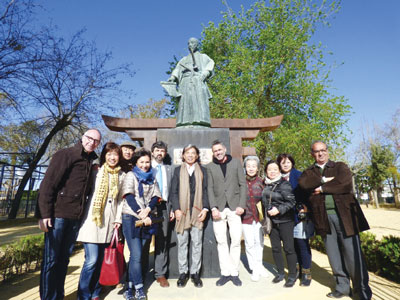
The Memorial service, which will be held on 11 March this year, will coincide with the 400th anniversary of the visit by Hasekura’s mission to Italy. A commemorative event will be held in Rome, and it should also be attended by many members of the Japón lineage. Although it seems naturel that the memories of a disaster tend to fade as time passes, Memorial services are still being held in various cities outside of Japan even now, four years after the disaster. I think these Memorial events are important because they give to people like me—people who have been living outside Japan for a long time—an opportunity to pray for the repose of victims and the recovery of disaster areas, and remind us to remain vigilant and be prepared for disasters.
Kenzo Takada, designer
(Resides in Paris, France)
“Celebrating the 70th Anniversary of the Founding of United Nations”
– Yasushi Akashi, former Under-Secretary-General at the United Nations
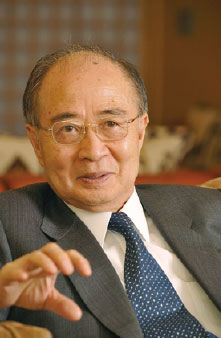
As Japan commemorates the 70th year of the end of World War II, the United Nations (UN) also enters the 70th year of its founding at San Francisco by the United States and other allied nations such as the United Kingdom. The number of UN member states has now grown by close to four times, from the initial 51 countries to 193 countries. Since joining the UN as the 80th member state in 1956, Japan has steadily expanded its participation and become increasingly more active.
During the Cold War between the free market countries and the Socialist bloc, centering on the United States and Soviet Union, respectively, the Security Council had often failed to function. The United Nations has, nevertheless, produced significant results in areas such as achieving colonial independence, strengthening developing countries, and promoting human rights.
After the end of the Cold War in 1989, there were high expectations for the UN, and peacekeeping operations took place across many regions in the world. Although sometimes beset by setbacks and difficulties, they produced various achievements. In recent years, the UN has put its utmost efforts into tackling cross-border challenges, such as ethnic conflicts, terrorism, infectious diseases and environmental problems.
The UN presents a rather rigid structural front. However, there are many areas where it has responded flexibly to international situations, and taken action which demonstrated its great potential as a global institution, in areas such as conflict resolution and refugee assistance. We can say that the UN is today an indispensable instrument for global governance and vital means for Japan’s diplomacy.
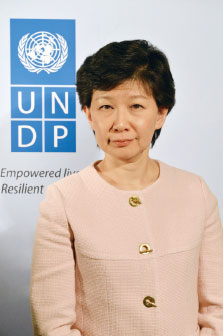
“Planting the seeds of hope: some of my perspectives from serving at the UN”
– Izumi Nakamitsu, Assistant Secretary-General and Assistant Administrator, Crisis Response Unit, United Nations Development Programme
Most of us, in our youth, go through experiences that leave a deep impression on our minds and shape the rest of our lives. For me, it was an encounter with an old woman in Bosnia, at the beginning of the civil war, which left an indelible mark on my life and career. This woman had been displaced by the conflict, and had seen four generations of people in her family—her grandfather, her father, her children and grandchildren—leave home to fight in the World Wars, and later in the Bosnian civil war. When I met her, I had just completed my assignment as Junior Professional Officer and had started working as regular staff at the Office of the United Nations High Commissioner for Refugees (UNHCR). As I heard her story, I began to truly understand the significance of the familiar words of the preamble of the Charter of the United Nations: “to save succeeding generations from the scourge of war, which twice in our lifetime has brought untold sorrow to mankind.” At one point, she told me: “if you have come to help us in Bosnia from Japan—the other end of the world—then there must be hope for the future.” I realized, at that moment, that someone like me, from Japan, could have a real impact on the lives of people through the work of the United Nations.
In the twenty years that followed, I continued to work in conflict and crisis contexts, from various angles, from humanitarian aid and support to democratization, to peacekeeping and, most recently, development. Since November 2014, I have been serving as Assistant Secretary-General and Assistant Administrator for Crisis Response at the United Nations Development Programme. I am now married with two daughters and, over many years of continuous work and travel to conflict zones, I have always remembered my encounter with the old Bosnian woman. Fulfilling her hopes means passing on a better world to my daughters.
It does not mean, however, indulging in simplistic idealism. The UN, 70 years into its existence, is a space of constant confrontation of national interests and diplomatic maneuvering by Member States. We must navigate these waters carefully and gradually, with subtle tact and good judgment, strategy and focus, and maintain a calm, controlled approach, even as we are driven by our passion and commitment to the ideals of peace, development and respect for human rights. 70 years after the end of World War II, as Japan enjoys sustained peace and prosperity and has regained its prominence as a world power, let us do our share, collectively and individually, to plant the seeds of hope in the places that need it most.
(2) Activities of Non-Governmental Organizations (NGOs)
A. Development assistance
It is estimated that in Japan there are over 400 non-governmental organizations (NGOs) engaged in international cooperation activities. Most of them grasp local needs at the grassroots level and provide flexible and detailed support in problem-stricken developing countries/regions and its importance in international cooperation is increasing.
MOFA provides financial cooperation in the form of grant assistance for economic and social development projects implemented by Japanese NGOs in developing countries/regions (Grant Assistance for Japanese NGO Projects) and actively provides Official Development Assistance (ODA) through NGOs. In the fiscal year 2014 (as of end-December), 27 Japanese NGOs implemented 38 Grant Assistance for Japanese NGO Projects in 19 countries and one region in Asia, Africa, the Middle East, and so forth. The projects cover a wide range of assistance, including, health/medical/hygienic care (maternal and child health, countermeasures for tuberculosis/HIV/AIDS, water/hygiene, etc.), rural development (environmental development/technological improvement for agriculture), support for the people with disabilities (vocational training/employment assistance, provision of wheelchairs for children, etc.), education (building schools, etc.), mines clearance, etc.
Japan Platform (JPF) was established in 2000, with an aim to conduct emergency humanitarian aid effectively and promptly through cooperation and partnership among the government, NGOs and the business community at the time of refugee crisis/large-scale natural disasters. As of end-December 2014, 49 NGOs are members of JPF. In 2014, besides Emergency response to flood in northern Afghanistan, Humanitarian assistance for internaly displaced populations in Iraq, Humanitarian assistance in Occupied Palestinian Territory, and Humanitarian response in South Sudan, JPF carried out humanitarian aid activities in Afghanistan, Pakistan, Syria and its neighboring nations, Myanmar, etc.
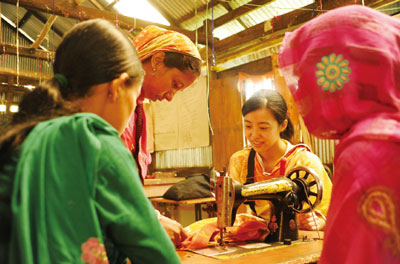 Women Empowerment in Pirojpur District (Bangladesh)(Source: KnK (NPO))
Women Empowerment in Pirojpur District (Bangladesh)(Source: KnK (NPO))
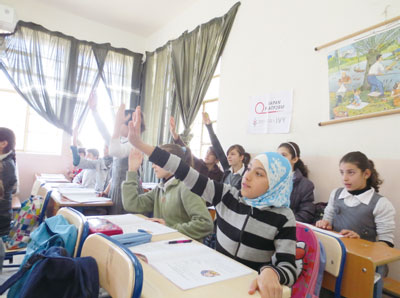 Education Support for Syrian Refugee Children in Erbil, Kurdistan Region, Iraq (Source: IVY (NPO))
Education Support for Syrian Refugee Children in Erbil, Kurdistan Region, Iraq (Source: IVY (NPO))
Japanese NGOs conduct a number of activities using contributions from supporters and the income earned from their own business. In recent years, with growing public interest in Corporate Social Responsibility (CSR), an increasing number of companies with technologies and funds implement CSR projects in developing countries in partnership with NGOs with much knowledge on international cooperation.
As seen thus far, by identifying NGOs that assume important roles in the area of development assistance as partners in international cooperation, MOFA and JICA provide indirect support for NGOs’ activities through various policy measures with an aim to enhance NGOs’ capacity, enhance their expertise and develop human resources so that NGOs are able to strengthen the foundation for their activities and perform further tasks. In 2014, MOFA conducted four projects, namely “NGO Study Group,” “NGO Overseas Study Program,” “NGO Intern Program” and “NGO Consultant Scheme”.
Moreover, the general meeting of the “NGO-MOFA Regular Consultation Meeting” was held in June 2014 in order to promote dialogue/coordination with NGOs. Also held were the ODA Policy Council to discuss overall ODA and the Partnership Promotion Committee to discuss support for NGOs and cooperation measures. MOFA also takes the opinions of NGOs into consideration when conducting negotiations at, for example, the United Nations with regard to the efforts in addressing global-scale issues in the development and humanitarian areas, including formulation of the Post-2015 Development Agenda.
B.Partnership in other major diplomatic areas
MOFA also cooperates with NGOs in areas other than those related to development assistance. For instance, at the 58th session of the Commission on the Status of Women (CSW) of the United Nations, Ms. Hiroko Hashimoto (professor emeritus of Jumonji University and principal of Jumonji Junior/Senior High School) represented Japan, and NGO representatives actively participated in discussions as members of the delegation of Japan. At the 69th United Nations General Assembly, Ms. Arino Yaguchi (associate professor of Tokyo Women’s Medical University) attended the Third Committee, which deals with a range of social and human rights issues, as a advisor to the representatives of the Government of Japan. In addition, the government of Japan has initiated dialogues with civil society including NGO representatives and intellectuals on matters related to government reports to be submitted based on various conventions on human rights, third country resettlement projects, and the Action Plan on Women, Peace and Security based on the United Nations’ Security Council Resolution (UNSCR) 1325 and related resolutions. In the elaboration process of this Action Plan, 12 small-group meetings with representatives of civil society and relevant authorities have been held thus far. Civil society will continue to be involved after the adoption of the Action Plan, in the implementation and monitoring phases, through their participation in the evaluation committee.
The presence of Japanese NGOs is also increasingly being felt in the area of disarmament and MOFA actively promotes cooperation with NGOs. Specifically, officials of MOFA officials participated in seminars on conventional weapons hosted by NGOs. Cooperation with NGOs is also implemented in the areas of removal of mines and unexploded shells and risk aversion education projects in Afghanistan and other countries.
Furthermore, in the area of nuclear disarmament, the government backs up NGOs’ activities to deliver the first-hand experiences of atomic bomb victims about the consequences of the use of nuclear weapons to the international community through the commissioned project called “Special Communicators for a World without Nuclear Weapons” launched in 2010. As of December 2014, a total of 139 persons have been sent all over the world under this commission mechanism.
As for the area of transnational organized crime, future challenges on measures against trafficking in persons have been discussed between the relevant government agencies and NGOs which engage in this issue.
(3) JOCV・SV
Japan Overseas Cooperation Volunteers (JOCV) is a program aimed at cooperation/assistance for the economic and social development of developing countries while young people aged 20 to 39 are living and working together with the local people and fostering mutual understanding. Established in 1965 and celebrating its 50th anniversary in 2015, the JOCV has dispatched a total of 39,727 volunteers to 88 countries (as of end-December 2014), and has contributed to the development of developing countries as the symbol of Japan’s aid with a Japanese flag. Dispatched members have been engaged in about 200 types of work in nine areas: planning administration, commercial/tourism, public utility works, human resources, agriculture and fisheries, health/medical care, mining, social welfare and energy.
An El Salvador women’s team coached by a JOCV took part in the international competition “World Table Tennis Championships” held in Tokyo from April to May 2014 for the first time in four years and the team took 63rd place, improving its previous world ranking.
Senior Volunteers (SV) is a program to dispatch middle aged persons from 40 to 69 years of age with wide-ranging skills and rich experiences to developing countries. The program has been expanding every year since its foundation in 1990 and by the end of December 2014, a total of 5,568 volunteers were dispatched to 73 countries and cooperation in nine areas, as the same as JOCV, has been implemented. Interest in SV program has been increasing in recent years from the perspective of supporting life after retirement and utilizing the rich experiences and expertise of retired senior citizens.
JOCV and SV are supported by the high aspirations of people who are keen to provide cooperation for the sake of economic and social development and reconstruction of developing countries. MOFA actively promotes these programs, seeing them as a core of participatory international cooperation by citizens. As of end-December 2014, 1,854 JOCVs and 441 SVs are working around the world (69 countries and 60 countries, respectively). Volunteer participants who have returned to Japan bring their knowledge and experience back to Japanese society by sharing their experiences in educational and local activity settings and these unique people’s participatory activities of Japan are highly appreciated and have many expectations both domestically and internationally, including recipient countries. The JOCV program was awarded a special prize of the Yomiuri International Cooperation Prize in November 2014 which recognizes the achievements of individuals or groups in the area of international cooperation and exhibition of the importance of cooperation and contribution to international community.
Experiences gained from JOCV/SV programs can lead to the growth of participants as human resources who will make a positive impact on the global arena. Thus, in cooperation with companies, municipal governments and universities which need means to develop human resources, the government promotes approaches to expand the participants through the dispatch of employees, teachers and students to developing countries. For instance, as a program responding to the needs of private companies, such as small-and medium-sized enterprises, aiming for international development of their businesses, the government launched the “Private-sector Partnership Volunteer Program” in FY2012. Furthermore, the government is committed to develop an environment for the feedback of the knowledge and experiences of the returned JOCVs and SVs into society, such as career support.
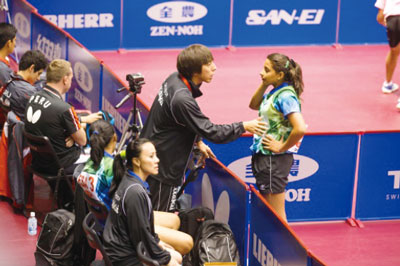 A JOVC member giving instructions to players at the World Table Tennis Championships (Source: Shinichi Kuno/JICA)
A JOVC member giving instructions to players at the World Table Tennis Championships (Source: Shinichi Kuno/JICA)
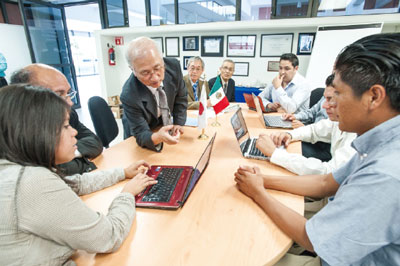 A SV member giving guidance to students in Mexico (Source: Kenshiro Imamaura/JICA)
A SV member giving guidance to students in Mexico (Source: Kenshiro Imamaura/JICA)
Some of the returned volunteers have been hired by the Reconstruction Agency working as help personnel in disaster-stricken local governments, being engaged in various areas of cooperation, such as management of temporary housing, agricultural work assistance for evacuees, health consultation and guidance, while utilizing their own specialties and experiences gained in JOCV/SV programs.
